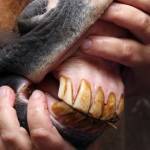Quidding and Teeth Dysfunction in Old Horses

When their teeth are sound, horses are able to nip, tear, and grind feedstuffs with incredible efficiency, preparing them for digestion that occurs further along the gastrointestinal tract. When teeth are diseased, in disrepair, or missing, horses will sometimes drop feedstuffs from the mouth in the midst of chewing it, a behavior known commonly as “quidding.” A similar condition, called “cud dropping,” has been noted in cattle but is not related to dental health.
Quidding occurs occasionally in horses that possess all of their teeth but require correction of sharp points and other dental anomalies, and is seen rarely in cases of tongue paralysis. More often, though, quidding is result of loose or lost teeth due to old age. Quidding should be considered more emblematic than problematic, a sign that a horse’s diet should be changed to provide optimal nutrition. Some horsemen theorize that quidding results from the horse’s innate knowledge that it cannot safely swallow large, unchewed boluses of forage—a built-in safety feature that protects against choke.
Regardless of whether quidding is instinctive or mechanical, the key to maximizing nutrition of horses with loose and missing teeth is to provide easy-to-process feedstuffs, according to Catherine Whitehouse, M.S., a nutritionist with Kentucky Equine Research (KER).
- Soft, leafy alfalfa (lucerne) hay. At first pass, this would seem like an inappropriate feedstuff for an older horses with dysfunctional teeth. Horses learn quickly to paw, shake, and agitate alfalfa to separate the preferred leaves from the stems. Though these leaves are small, they are easy for horses to grasp with their lips. Many older horses can successfully strip alfalfa hay of its leaves. “The leaves are friable, disintegrating quickly once in the horse’s mouth. Not only are leaves tasty, they provide a great deal of nutrition,” Whitehouse said.
- Hay pellets. This alternative forage is especially useful in the care of older horses, as the pellets are typically made from good-quality hay that is pulverized prior to pelleting. The pellets crumble easily in the mouths of horses as they chew, and they present little problem if swallowed whole, so long as a horse isn’t a chronic bolter. “I often recommend feeding hay pellets to older horses, and if a horse has an especially difficult time chewing, I advise wetting the pellets to create a mush,” she said.
- Senior feeds. Most of these feeds feature an array of easily digestible energy sources such as fat in the form of stabilized rice bran and vegetable oil, and fermentable fiber in the form of soybean hulls and beet pulp. Most horses have no objection to textured or pelleted senior feeds.
- Vegetable oils. Horses are generally fond of vegetable oils, including corn oil, soybean oil, rice oil, canola oil, or a blend of these. “Oils pack a caloric punch, so drizzling them over hay pellets or senior feed is another way to add energy to a diet, if the senior horse in questions has difficulty maintaining body weight,” Whitehouse remarked. Though fish oil is the go-to supplement for adding omega-3s to the diet (look to EO-3 for this), calories are best added through the use of canola or soybean oil.
An equine nutritionist can help owners formulate a diet that will provide all of the nutrients necessary for optimal health. Check in with a KER nutritionist today.
Though horses with loose or lost teeth might not be able to process long-stem forages, many horse owners will allow them access to hay and forage to provide “chew time,” which is as inborn in horses as swishing their tails to shoo away insects. As long as a horse has learned to quid and is satiated by easy-to-chew meals, it will likely find pleasure in grazing.
Older horses seem prone to feet and skin problems, both of which can be bolstered by the addition of nutritional supplements. A biotin supplement will often help hooves, skin, and hair. A dose of 20 mg per day of biotin is recommended to strengthen hooves. Bio-Bloom PS (Bio-Bloom HF in Australia) not only provides the suggested amount of biotin but also methionine, an essential amino acid used in keratin production, as well as zinc and iodine.
Supplementation with omega-3 fatty acids, especially the “marine omega-3s” docosahexaenoic acid (DHA) and eicosapentaenoic acid (EPA), could strengthen immunity in older horses. One effective marine-derived source of DHA and EPA is EO-3. Anecdotal reports from horse owners have underscored its usefulness for skin problems.








